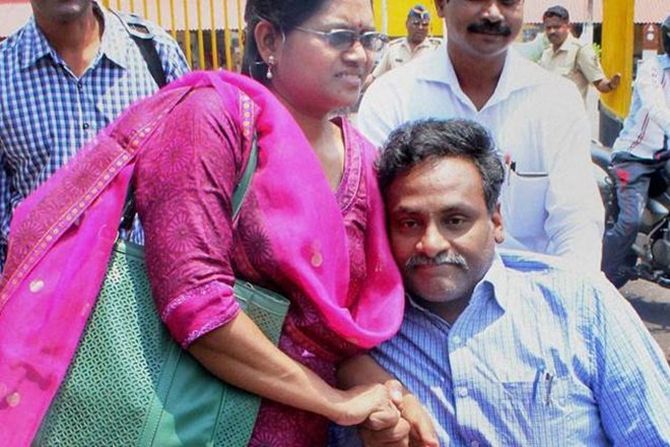In the Nagpur Central Jail, a COVID-19 patient who has been complaining since the last 10 days of high fever, breathlessness, joint pain, cold and sore throat, is being treated in jail quarantine.
The prisoner is Professor G N Saibaba, 90% handicapped, wheelchair-bound, with a damaged heart and pancreas; dependent on others even for his essential bodily functions.
Jyoti Punwani reports.

One has heard of asymptomatic or mild cases of COVID-19 being treated in home quarantine.
But in the Nagpur Central Jail, a COVID-19 patient who has been complaining since the last 10 days of high fever, breathlessness, joint pain, cold and sore throat, is being treated in jail quarantine.
The prisoner is Professor G N Saibaba, 90% handicapped, wheelchair-bound, with a damaged heart and pancreas; dependent on others even for his essential bodily functions.
Nobody goes near quarantined COVID-19 patients. Their food is left at the door; they are given a separate bath and toilet, their clothes are washed separately.
Professor Saibaba is unable to feed himself since thanks to rough handling by police and jail staff, only one of his hands is functional.
The two helpers assigned to him by the jail tested negative, so they cannot be expected to assist him.
Who is feeding this COVID-19 patient? Who is helping him to carry out his essential functions?
"We don't know," says his frantic wife, Vasantha Kumari. "He called us on Wednesday the 17th only to tell us that he has been quarantined in jail and is being treated with antibiotics. He said he was feeling very weak, unable to get out of bed. Before we could ask anything, the time allotted for the call was up."
Professor Saibaba was tested on February 10 after his family sent an urgent email to the jail superintendent because he had called them complaining of COVID-19 symptoms.
On February 13, when he called his wife, she found him speaking with difficulty, breathless and with a sore throat.
Yet, Nagpur Central Jail Superintendent Anup Kumre told the Indian Express: 'We will treat him here in the jail itself like we have treated other inmates... He is already lodged in a separate Anda cell. He will be treated in his cell by the jail doctor.'
A statement dated February 18, signed by 22 Indian and international organisations including PEN America and the University of Nottingham Human Rights Centre, has urged the authorities to release Professor Saibaba on medical parole and have him treated in a private hospital, since the Nagpur Government Hospital has no facilities for treating wheelchair bound patients.
The same plea has been made once again by the Committee for the Defence of Professor Saibaba.
As his oxygen levels drop further (as happens in Covid) there will be an increased strain on his heart, increasing chances of cardiac arrest, the Committee has said in a statement. 'Prof Saibaba fears that the high level of exposure to infections in the jail will adversely affect his comorbidities, and prove highly dangerous, even fatal,' adds the statement.
The statement also asks that the jail authorities share his medical records with his family, which they have so far refused to do.
In the five-and-a-half years that Professor Saibaba has spent in Nagpur Central Jail, first as an undertrial and then as a convict, such appeals, including three from United Nations human right experts, have had no effect on either the jail authorities or the Maharashtra government.
As an undertrial, Professor Saibaba could get bail from the Bombay high C]court and the Supreme Court.
However, after his conviction, the Nagpur bench of the Bombay high court has refused to grant him parole even to visit his dying mother.
Will his family have to approach the court now to ensure that he is shifted to a private hospital? Even that would be difficult, for said Vasantha Kumari, "We have not been provided any medical records to show in court."
It may be recalled that 81-year-old Professor Varavara Rao, an accused in the Bhima Koregaon case of having links with Maoists, whose health has steadily deteriorated in Taloja Jail in Maharashtra for lack of adequate medical treatment, was rushed to hospital when he tested positive for COVID-19 last July.
But Professor Saibaba, convicted for links with Maoists, has not been considered worthy of such care, despite his physical disabilities.
The world watches the continued denial of his fundamental right to life in the world's largest democracy.








 © 2025
© 2025